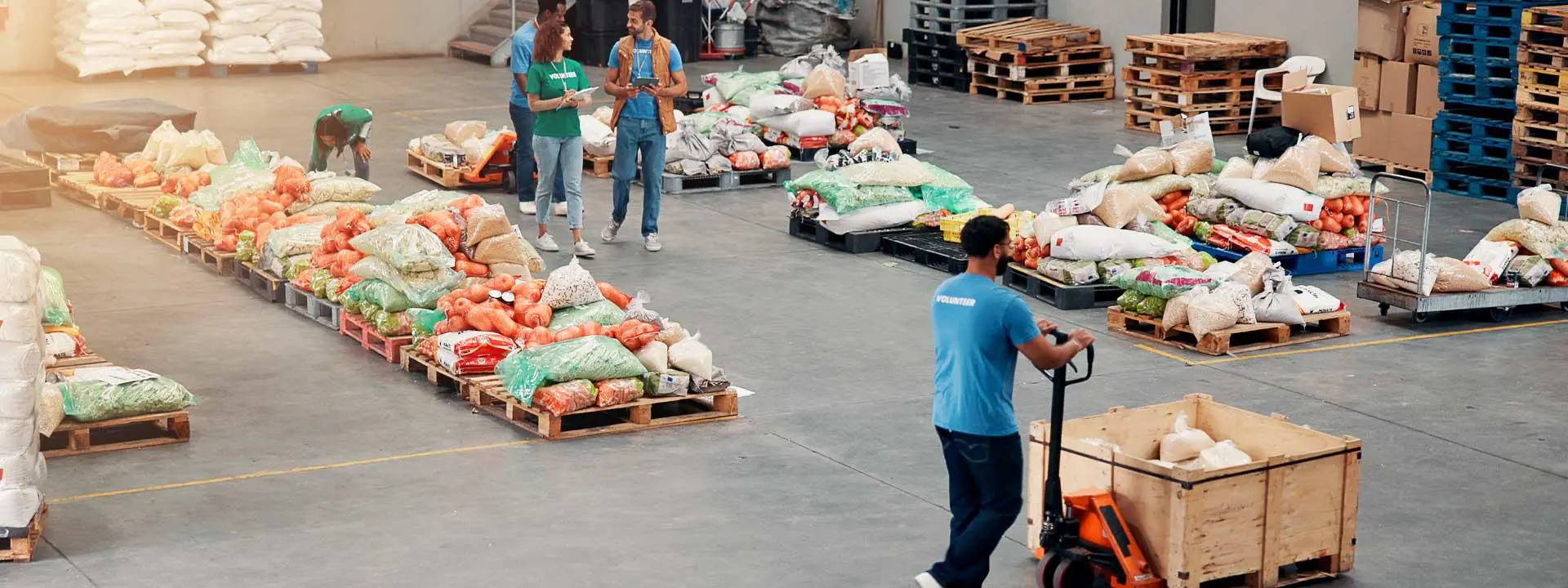Humanitarian Logistics: A career with purpose

If you're seeking to align your career with purpose – whether you're starting out, changing direction or preparing for your next step – logistics offers a powerful way to make a tangible impact.
Nowhere is that impact more critical than in humanitarian contexts, where supply chains support crisis response, protect lives and enable long-term recovery.
Our online MSc in Supply Chain Management and Logistics prepares you to lead in this dynamic and essential field. One of its standout features is a specialist course in Humanitarian Logistics, developed with the Kühne Foundation – a globally recognised organisation in logistics education and crisis response.
We see people every day suffering. Everybody is asking for answers… and we need to have organisations that actually deliver support for the beneficiaries.
The role of logistics in humanitarian crises
When disaster strikes, logistics is the critical link between those offering help and those who need it most.
From shipping emergency supplies to managing health-related supply chains or rebuilding infrastructure, humanitarian logistics is a high-stakes, complex field that demands both technical skill and human understanding.
Dr Andre Kreie, Director of Global Logistics Education at the Kühne Foundation, explains:
“Humanitarian logistics is a very broad and complex field... this course really gives a great overview about the different perspectives… from operations to strategic to stakeholders to kind of a more sustainable approach.”
Through the course, you’ll learn to coordinate across international agencies, NGOs and local partners, while navigating challenges such as limited infrastructure, volatile demand and ethical risks.
As Andre adds: “We see people every day suffering. Everybody is asking for answers… and we need to have organisations that actually deliver support for the beneficiaries.”
Real-world insight from the field
The Kühne Foundation brings more than technical expertise - it brings authenticity. The course draws directly from field experience across multiple regions, including East Africa, Haiti and South-East Asia. These insights are embedded into the curriculum, helping you connect strategic concepts with practical, on-the-ground realities.
Wolf-Christian Noske, Senior Programme Manager at the Kühne Foundation, transitioned from commercial logistics to humanitarian work after seeking greater purpose in his career.
“I asked myself, what is the deeper sense of what I am doing here? I was looking for some more meaningful jobs and ended up in the humanitarian sector.”
Christian’s fieldwork began with the German Red Cross following the 2010 earthquake in Haiti, where he coordinated supply chains for shelter construction and disease response. His experience directly shapes the course content, helping students understand what logistics looks like under real pressure.
“You need to have a hands-on mentality… instead of just delegating, you take it up yourself. And you need a good sense for people… especially with your local colleagues, to build trustful relationships.”
Designed for professionals who want flexibility
Our MSc in Supply Chain Management and Logistics is tailored to the needs of working professionals. Delivered fully online, it allows you to earn as you learn, without pausing your career.
You’ll study:
- Core modules in logistics strategy, global procurement and operations
- Optional courses like Business Analytics and Delivering Successful Projects
- Specialist topics such as green logistics, systems thinking, risk and stakeholder management
The learning environment is international and collaborative. Andre describes it well: “The online course becomes a melting pot of different perspectives on humanitarian logistics… both are fed with international ideas, cultures, people with different backgrounds.”
You’ll be part of a global classroom, learning alongside peers from different regions and industries who bring diverse experiences to every discussion.
Accreditation and Recognition
The MSc Supply Chain Management and Logistics is accredited by the Chartered Institute of Procurement & Supply (CIPS) and the Chartered Institute of Logistics and Transport (CILT). These accreditations not only demonstrate academic quality but also offer graduates professional advantages: exemptions from parts of CILT membership requirements, and the opportunity to progress through CIPS membership levels up to MCIPS. This means your qualification doesn’t just carry global recognition - it actively supports your professional development and career progression.
Building a future-ready career
This programme is designed to prepare you for roles where logistics meets leadership. You’ll be equipped for positions such as:
- Humanitarian logistics officer
- Emergency response coordinator
- Supply chain manager (NGOs or international organisations)
- Procurement specialist
- Strategy advisor in humanitarian operations
These skills are just as valuable in the commercial sector, especially as companies prioritise resilience, sustainability and ethics. With logistics employment projected to grow by 19% over the next decade (U.S. Bureau of Labor Statistics), this degree positions you for long-term success.
You also don’t need to work in a field-based role to contribute. As Christian notes:
“Everybody who has a speciality – finance, logistics, business management or health – can use their education seriously in the humanitarian sector… You don’t have to start in the field.”
You’ll gain access to more than 500 Coursera certificates, helping you continue developing skills in digital supply chain, leadership, finance and more.
And when it’s time to celebrate, you can graduate in person at one of our campuses in Edinburgh, Dubai or Malaysia, joining Heriot-Watt’s global alumni network – one of the oldest in the UK.
Ready to align your career with your values?
Explore our online MSc in Supply Chain Management and Logistics today and take your next step into a career that delivers real impact.